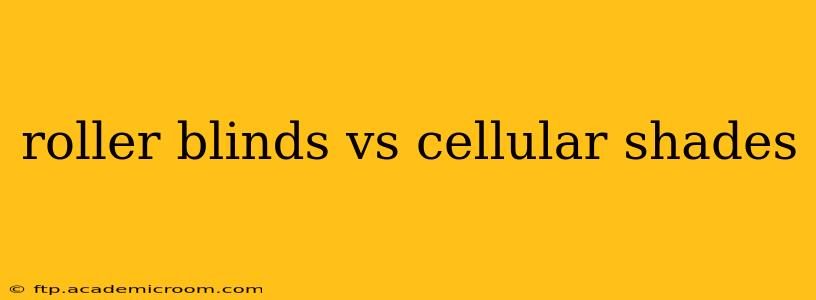Choosing the right window treatment can dramatically impact your home's aesthetic and functionality. Two popular options, roller blinds and cellular shades, both offer effective light control and insulation, but with distinct differences. This comprehensive guide will delve into the key features of each, helping you determine which best suits your needs and budget.
What are Roller Blinds?
Roller blinds, also known as roll-up blinds, are a classic and versatile window covering. They consist of a single piece of fabric that rolls up neatly onto a tube at the top of the window frame. They're simple to operate, offering a clean, minimalist look that complements various interior design styles. Materials range from lightweight fabrics offering sheer light filtration to heavier, blackout options for complete darkness.
Advantages of Roller Blinds:
- Affordability: Roller blinds are generally less expensive than cellular shades.
- Simplicity: Their straightforward design makes them easy to install and maintain.
- Versatility: Available in a vast array of colors, patterns, and fabrics to match any décor.
- Space-saving: They don't take up much space when raised, ideal for smaller windows.
Disadvantages of Roller Blinds:
- Limited Insulation: Generally offer less insulation compared to cellular shades.
- Less Privacy: Sheer fabrics offer minimal privacy, especially during the day.
- Potential for Fading: Certain fabrics may fade over time with prolonged sun exposure.
What are Cellular Shades?
Cellular shades, also known as honeycomb shades, feature a unique honeycomb-shaped structure. This design traps air within the cells, providing superior insulation and energy efficiency compared to traditional blinds. They come in various opacities, from sheer to blackout, offering flexibility in light control and privacy.
Advantages of Cellular Shades:
- Excellent Insulation: The honeycomb structure significantly improves energy efficiency by trapping air, reducing heat transfer.
- Enhanced Privacy: Even sheer options provide a good degree of privacy.
- Noise Reduction: The cellular structure helps to absorb sound, reducing outside noise.
- Variety of Options: Available in a range of colors, fabrics, and light-filtering capabilities.
Disadvantages of Cellular Shades:
- Higher Cost: Cellular shades are generally more expensive than roller blinds.
- More Complex Installation: Installation can be slightly more involved than roller blinds.
- Cleaning Challenges: The honeycomb structure can make cleaning slightly more difficult.
What is the Difference Between Roller Blinds and Cellular Shades?
The core difference lies in their construction and resulting functionality. Roller blinds offer simplicity and affordability, while cellular shades prioritize energy efficiency and insulation. The choice often hinges on budget, desired level of insulation, and aesthetic preferences.
Which is Better for Insulation: Roller Blinds or Cellular Shades?
Cellular shades are significantly better insulators than roller blinds. The honeycomb structure traps air, creating an insulating barrier that reduces heat transfer in both summer and winter, leading to energy savings.
Which is Better for Light Control: Roller Blinds or Cellular Shades?
Both offer light control options, ranging from sheer to blackout. The best choice depends on individual needs. If complete darkness is crucial, both offer blackout options. However, cellular shades might offer slightly better light blocking due to their structure.
Which is Better for Privacy: Roller Blinds or Cellular Shades?
While both offer privacy options, cellular shades often provide better privacy, particularly the heavier fabrics, even during the day. The honeycomb structure helps to obscure the view from the outside more effectively.
Which is Easier to Clean: Roller Blinds or Cellular Shades?
Roller blinds are generally easier to clean. Cellular shades can be more challenging to clean due to their intricate honeycomb structure. Dust and debris can accumulate within the cells, requiring more careful cleaning.
Which is More Expensive: Roller Blinds or Cellular Shades?
Cellular shades are typically more expensive than roller blinds. Their superior insulation and construction justify the higher price point for many homeowners.
Conclusion: Choosing the Right Window Treatment
Ultimately, the "better" choice between roller blinds and cellular shades depends entirely on your specific needs and priorities. Consider your budget, desired level of insulation and light control, and aesthetic preferences before making a decision. If energy efficiency is paramount, cellular shades are the clear winner. If budget is a major concern, roller blinds offer a more affordable and equally stylish solution. Carefully weighing these factors will help you select the perfect window treatment to enhance your home's comfort and beauty.
